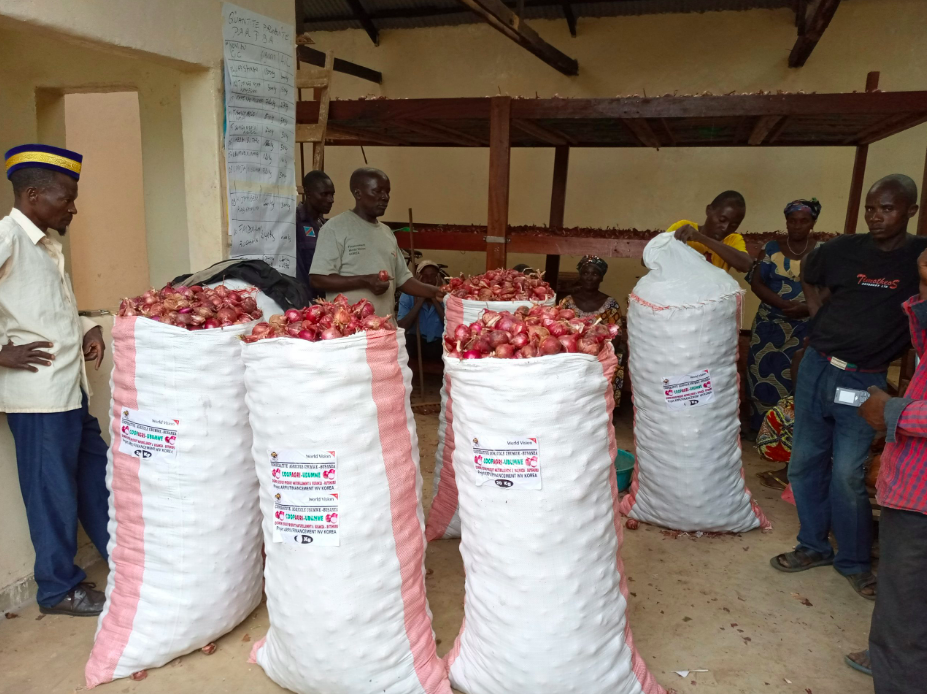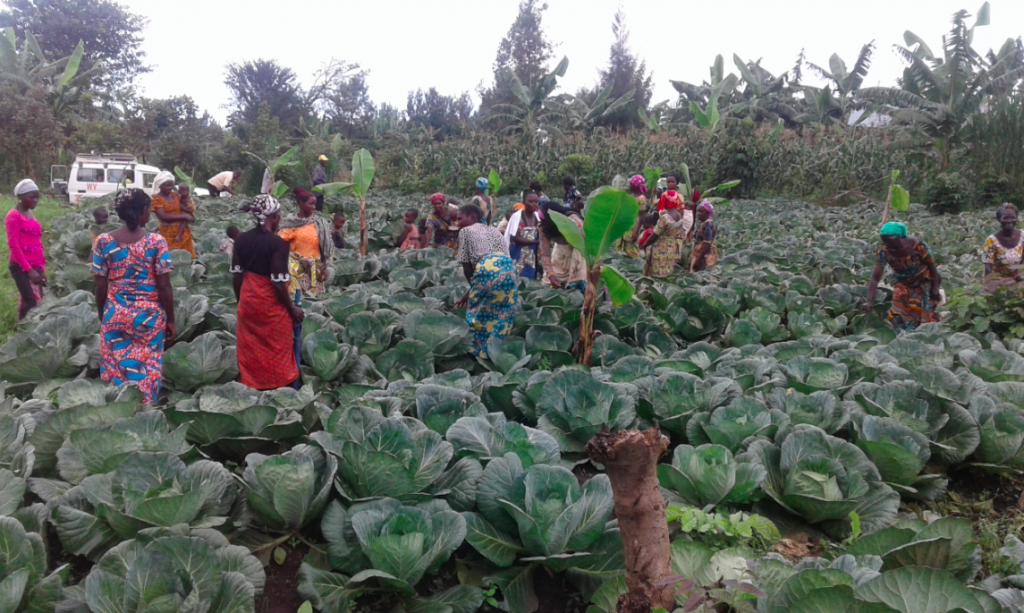The experience of World Vision DRC
By Gabriel Mukoloka
Originally posted to https://www.cdacollaborative.org/blog/can-better-programme-adaptation-defined-by-strong-community-participation-and-engagement-strengthen-our-contribution-to-local-ownership/
These are deeply challenging times for people like me who are working on the frontline in the Eastern Zone of the DRC. I continue to hear stories like that of Justine Tumaini, a 13-year-old girl and student of Buhimba Primary School in Busanza village of Eastern DRC. Justine and her friends had no access to latrines in their school, and had to try to find a latrine in neighbouring schools. But, every time they were chased away. Instead, they were forced to go the bathroom in the bush, which comes with a high risk of infection and sexual abuse. Thankfully, Justine participated in our education in emergency intervention, which offered free school fees, school materials, and teacher trainings.
Given the changing nature of the context in Eastern DRC, we (World Vision DRC) adapted this programme to include a water, sanitation and hygiene (WASH) component in schools, allowing girls and boys to access proper latrines. This gave Justine and her friends options to address the immediate issues, while we, and our partners, work towards developing community resilience, peace, and longer-term, improved health outcomes in Busanza and the surrounding area. We were able to quickly and appropriately adapt this programme because of World Vision’s Fragile Context Programming Approach (FCPA).
Why is adaptive management important?
Numerous reports from NGOs, universities, and UN Agencies all affirm that humanitarian, development, and peacebuilding needs in fragile states and protracted crises are interlinked, but corresponding interventions are often not. According to a UNOCHA analysis, inter-agency humanitarian appeals now last an average of seven years, and the size of appeals has increased by nearly 400 percent in the last decade. This situation requires urgent adaptation. One of the key concepts as outlined in the New Way of Working is the multi-year timeframe which focuses on funding operations built over several years to achieve context-specificity and, at times, to address moving targets. However, this is not the typical way of working for many in the humanitarian community, therefore the approaches used by the sector require urgent adaptation.

As my colleague Maya Assaf, Director of Conflict Sensitivity and Peacebuilding at World Vision, explained in her blog last month, after 20 years of responding in a setting defined by multiple-layers of a protracted conflict, World Vision has developed and tested an approach to programming in fragile contexts, which allows us to address both immediate needs of the community for survival, as well as root causes of fragility, called FCPA. FCPA recognises that programmes are not linear, as humanitarian, development, and peacebuilding needs are constantly shifting in their priority status in changing contexts of episodic violence, multiple displacement, and environmental degradation.
In the DRC specifically, the delayed 2018 legislative and presidential elections created uncertainty in the country’s future and demonstrated that there was a high likelihood that the needs of the community could change rapidly and with little notice. While operating in this environment was quite unstable, it did however offer us with an opportunity to pilot the FCPA, which allowed for much more flexibility in programming than previous approaches. This approach is built on anticipating the community’s needs and priorities as they evolve and allow time to plan how we need to prepare and be ready to adapt to the changing context. Ever since testing the FCPA in 2018, we have been using this model to quickly adapt interventions at the intersection of the emergency-rehabilitation-development iterative cycle. And we found that this approach enabled greater community participation, which lead to overall greater local capacity and ownership.
Adaptability can increase local ownership
Our experience in the DRC with the WASH project (that helped Justine and her friends) has shown us how adaptive management can lead to greater community participation. It has increased our ambitions for greater local ownership and capacity. As a result, World Vision has developed shared objectives with communities which allows us to consistently work towards addressing the drivers of instability while sustainably meeting the needs of the most vulnerable children.
In my experience, the case of the DRC is a good example of how an adaptive management approach (such as the FCPA) can be used to address the perennial crisis with periods of lull and resurgence of generalised or localised conflict.

For example, usually, project staff focus on the execution of relief activities in the implementation plan. Completing these activities is considered proof of performance, and there is a tendency to keep these same activities and interventions even if the context changes and requires doing things differently. I found that the FCPA forces staff to link relief, rehabilitation, and development programming from the very beginning. The approach asks staff to take on multiple skills-sets and approach the work with a more flexible attitude, which is nurturing a culture of strategic planning and implementation.
Adapting in Real Time during COVID-19
My staff members came to realise that they had the ability to be flexible and adapt the project and make decisions based on real time information from the community about changing needs. This mindset helped them when COVID-19 began. With the onset of COVID-19, my team conducted a quick contextual analysis and proposed adaptations to our original programming that not only prevents the spread of the disease, but also reduces the effects of the pandemic on food insecurity. Through this process we found that sometimes we did not need to make drastic adaptations to our programs; rather, the key learning here is to work in partnership with the community: to listen, consult and appropriate solutions and then working together to implement them.
For effectiveness, I see that programming must be based on the context and flexible to address the Nexus (humanitarian, development, and peacebuilding) appropriately. As a result of the FCPA, World Vision is partnering with community structures, such as health centres, water management committees, and local authorities and village leaders to plan and work together to save the lives of children and to reduce their vulnerability by improving their long-term opportunities for a better future.
We can cascade this same flexibility to local communities. We must work to help them see that they can propose critical changes to programming that responds to their needs at a particular point in time, and we will work to make those changes.This also means that they can also be implementers in their own right, as we work together towards shared objectives of serving the most vulnerable children. Listening and adapting in response to their needs puts them firmly at the centre of humanitarian action.
Can greater adaptive management lead to greater local leadership?
The foundation for effectively adapting is community participation and engagement. Below offers some key lessons we’ve learned about effective adaptive management practices and how those have led to greater community participation and local ownership.
Greater community participation contributes towards local ownership. Through the implementation of the FCPA, we achieved a higher level of involvement of crisis-affected communities in our work. This focused on the participation of the people in analyzing the root causes of vulnerability, as well as secondary context data. Community participation included reflecting on how they wanted to shape the project and their responsibilities with implementing and monitoring. This is critical learning for doing good adaptive management and further supports local ownership, in terms of strengthened local capacities. During the COVID-19 response in the DRC, for example, the community took over many activities as staff could not move easily. This led to volunteers collecting data for monitoring and evaluation purposes and transmitting it back to World Vision staff by phone. Growing local capacity is important for sustainability of interventions, relevance of responses to the complexities of different contexts and needs, and maximising impact and effectiveness.
Greater community engagement allows us to avoid surprises in the evolution of the project. The FCPA approach is founded in anticipation, often utilizing scenario planning with local communities, to avoid shocks and to be prepared for possible changes to the project. This planning allows us to respond in record time to the changing context. A tool for monitoring trigger indicators was developed to facilitate the process of change and decision-making and this is what helped us with various adaptations early in the project. Strong community engagement during this exercise, as well as coordination with government stakeholders and existing humanitarian structures, ensured that we were able to capture the right information, empower local actors, and consider what joint actions we could do together.
Greater community engagement requires sustainable and flexible long-term projects (minimum three years). Short-term projects are limiting for fragile contexts and are an inhibiting factor when trying to work in the Nexus. We had put together three most likely scenarios for the context of our programming area, spanning a period of 12 months. However, during that time, we found that significant changes we predicted did not come about and/or new situations arose (such as Ebola or COVID-19). Because of this unknown, we needed to reassess the situation and consider future scenarios and their impacts on the community. After this analysis we then could decide together what was required for projects to be most relevant and effective. Our learning from this was that adaptive programming requires long term engagement but also flexible parameters from us and our donors. Programs in complex environments should also include ongoing context monitoring with communities, in order to look at what scenarios are occurring, when our plans need revisiting, and at what point projects should be adapted in light of context changes. A longer-term time frame enables projects to develop strong community relationships and participation mechanisms and build the capacity of the local community structures to achieve greater resilience for communities overall.
Greater community engagement requires flexible funding. We have found projects which have private funding, which has fewer reporting requirements, and are more responsive to the context changes. In contrast, I have found that public and multilateral funded projects are often governed by restrictive regulations that do not allow for the flexibility needed in a fragile context. My learning here is that we need to advocate to donors for flexible public and multilateral funding that allows us to engage with the most vulnerable communities, in order to ensure their participation and ownership. Recently, I have seen some flexibility from many of our donors. Recently, many of our donors have allowed us to use existing funding for COVID-19 interventions, but this flexibility is rarely applied to large scale or for longer-term projects. We have found that flexibility in funding can come with frequent communication, especially context updates to donors. Quality and relevant updates to donors are more likely and more possible in places where we have strong community engagement and participation.
Flexibility to address fragility
Our ability to do adaptive management in a fragile context has surprised other humanitarian actors. While there is a great need, the application of FCPA has allowed us better access and assist the most vulnerable children. Our learning in the initial pilot has now enabled us to expand our work to a new area in the same province and has also influenced other humanitarian actors to gain the confidence to venture into an often-disregarded context.
In a fragile context things can change quickly. To be aware of this and have a flexible programming approach is very important and the key to unlocking this is community participation. In the DRC, the Ebola outbreak, and COVID-19, are the lived examples of how these principles of adaptive management can be put into practice, and the importance of working with communities. I hope this approach inspires stakeholders (NGOs, donors, communities, etc.) working across the Nexus to be more flexible and community based, and ultimately to have a greater impact in fragile contexts.

